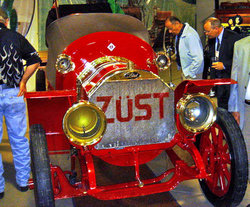Zust
1907 - 1917
When, early in the century, Roberto ZÜST died (a Swiss-born engineer who had founded a factory for precision machine tools for metal working in Intra, Lake Maggiore), his children in 1905 decided to open a second factory in Milan, to build their own cars and commercial vehicles. The first two ZÜST models had 4-cylinder engines ranging from 7432 cc and 11308 cc. In 1906 a branch was opened in Brescia, which was named Brix-ZÜST (from the Latin name of Brescia) and was used to produce cheaper cars. After the 14/18 HP (with a 3770 cc engine), the Brix-ZÜST presented the 18/24 HP, with a 4-cylinder 3770 cc, and 10 hp with a 1386 cc 3-cylinder engine. In 1910, the 10 hp engine was increased to 1501 cc and a batch of 10 copies, of these cars, were exported to London, where they went into service as taxis. In 1911 the 10 HP, 14/18 HP (which had since been increased to 2297 cc) and the 18/24 HP (increased to 4942 cc) were put out of production.
When, in 1912, Brix-ZÜST was absorbed by ZÜST, it went to the person who had always controlled the shares. ZÜST, meanwhile, had become a household name known throughout the world, participated with a 28/45 HP in the grueling New York - Paris race in 1908. This competition, which was approached by ZÜST with extreme seriousness and commitment despite the unfortunate outcome (the race was won by American Thomas in front of the German Protos). The reliability of the 28/45 HP was shown in this race, along with others. Sometimes they were in least place (the 28/24 HP had to go through the Siberian wilderness, thus repeating the companies accomplished in 1907 by more powerful Itala 35/45 HP during the raid Beijing - Paris).
At the wheel of this glorious ZÜST was the driver Sirtori, his fellow adventure, the mechanic Haaga, and the journalist of the Mattino di Napoli (Morning of Naples), Antonio Scarfoglio. These three brave men had to face hardships of every kind: for example, in America, while they were engaged in the stretch between the Alleghenies and the Rockies were even attacked by a pack of wolves. Ironically, the 28/45 HP, after resisting a thousand hard miles, went accidentally destroyed in the English padock of Bromley, it was completely burned by a fire caused by a porter, who had come in with an acetylene lamp. The productions of ZÜST, around the years of the race New York – Paris, was made up of three models: the 15/25 HP (2853 cc), the 35/50 HP Special GS (6321 cc) and the 50/60 HP later renamed S 235 (7432 cc). In 1913 they presented the new HP 25/35 S 305, characterized by a radiator similar to that of Fiat at the time, with a Biblocco 4712 cc engine. In the period from 1915 to 1916, ZÜST launched the 15/25 HP 365 S with a displacement of 2952 cc.
In October 1, 1917 ZÜST was absorbed by the Officine Meccaniche of Milan, the future OM, one of the ancestors of Fiat and IVECO.
External link
| Car Information and Photos by Marque: A - B - C - D - E - F - G - H - I - J - K - L - M - N - O - P - Q - R - S - T - U - V - W - X - Y - Z |
| Motorcycle Information and Photos by Marque: A - B - C - D - E - F - G - H - I - J - K - L - M - N - O - P - Q - R - S - T - U - V - W - X - Y - Z |

